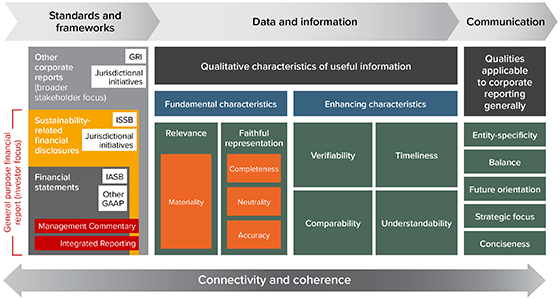Policy and insights report
With today’s increasingly diverse audiences, corporate reporting is constantly evolving, resulting in a blend that is simultaneously familiar and foreign

Changes in corporate reporting over the past decade have been largely driven by a combination of legislation, growing external stakeholder pressure, and technological advancements. At the core, changes in what is perceived as a ‘good organisation’ have driven a shift in focus from profits to risk and sustainability.
Key insights
Through various stakeholder engagements, we confirmed the following:
- Corporate reporting is about communicating how an organisation is operating and responding to changes in its external landscape. Organisations need to explain their risks and opportunities in a way that connects their financial and non-financial information to their wider strategy and governance, while addressing how they plan to become more equitable and sustainable, and be attractive to investors.
- Existing characteristics and qualities relating to corporate reporting are robust and remain relevant. How these characteristics and qualities are embedded within today’s ways of working continues to influence quality of reporting. At the same time, organisations need to bring together different pieces of information to tell a connected and cohesive story.
- Connectivity and coherence are people- and process-driven, and require a certain level of mastery to achieve. Leadership commitment and effective communication among internal and external stakeholders is important. This is a journey of continual improvement, and through connectivity, we may move towards achieving integration in reporting.
- Decision-useful information begins with understanding who the organisation’s stakeholders are and their information needs. A balanced report would clearly identify and address this.
ACCA's eight principles of good corporate reporting
Grouped into four main themes, connectivity and coherence are key in achieving decision-useful corporate reporting, and cut across the other three themes – standards and frameworks, data and information, and communication.
Together, these form the foundation for ACCA’s principles of good corporate reporting. Important recurring themes are also embedded across the principles, such as balancing the costs and benefits of reporting, and considering the impact of technology and innovation.
Foundational attributes of the principles of good corporate reporting
ACCA calls on policymakers, standard-setters and regulators, and those involved in the corporate reporting process, to work closely together on the following:
Swipe to view table
| Themes | Principles of good corporate reporting |
|---|---|
| Connectivity and coherence – a people- and process-driven exercise |
1. Embed connectivity and coherence |
| Standards and frameworks – selection, adoption and implementation |
2. Apply a 'building blocks' approach, building on a global baseline 3. Be principles-based and apply proportionality 4. Maximise comparability, with interoperability as a catalyst |
| Data and information – for whom, and to what extent |
5. Understand and meet stakeholders' information needs 6. Take a holistic approach to corporate reporting 7. Enable and support good governance practices |
| Communication – telling the organisation's story |
8. Ease access and avoid disclosure overload |
Using this report
To fully appreciate the benefits of this research, we encourage you to:
- first obtain an overview of the principles and foundational attributes through the ‘in brief’
- then, delve into the details and examples set out in the full report.
This research considers and explores how the principles and foundational attributes interact and support policy making, standard-setting and decision-making, as well as the challenges and tensions that may arise during their application. Useful tips are included to facilitate your journey of continual improvement.
Further reading
-
Sustainability reporting hub
-
Making information connections for sustainable value creation
-
Ethical dilemmas in an era of sustainability reporting
-
Sustainability assurance – rising to the challenge
-
Integrative thinking: the guide to becoming a value-adding CFO
-
Invisible threads: communicating integrated thinking
Policy and insights report
"Corporate reporting is not just about disclosures, but about communicating how an organisation is operating and responding to changes in its external landscape"
A sustainability expert
"In keeping pace with today’s dynamic business environment, our eight principles help organisations and policymakers understand their interconnecting roles in building robust reporting practices that foster trust and accountability, enabling them to navigate complex and changing priorities"
Hsiao Mei Chow, head of corporate reporting insights – sustainability, ACCA



